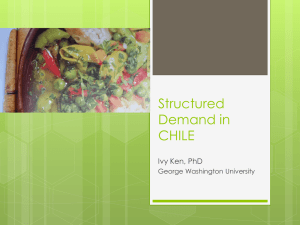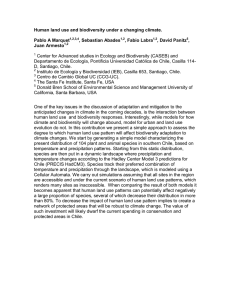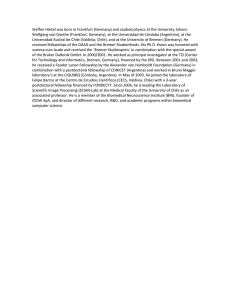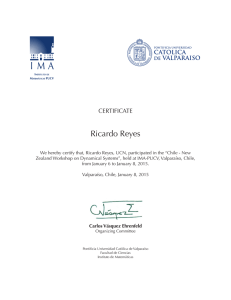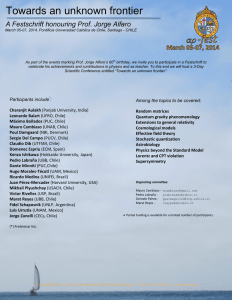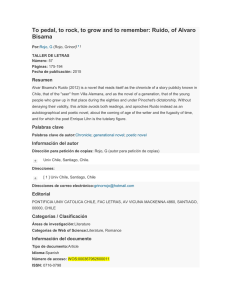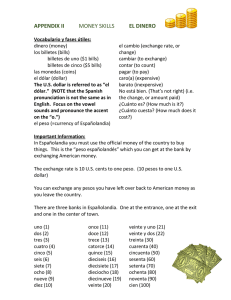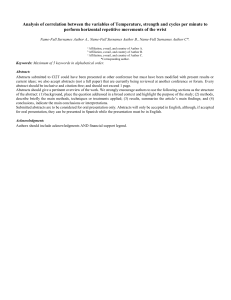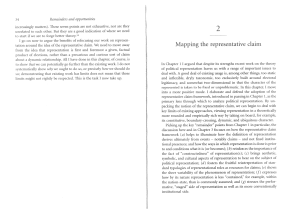abstracts - Foro Internacional
Anuncio
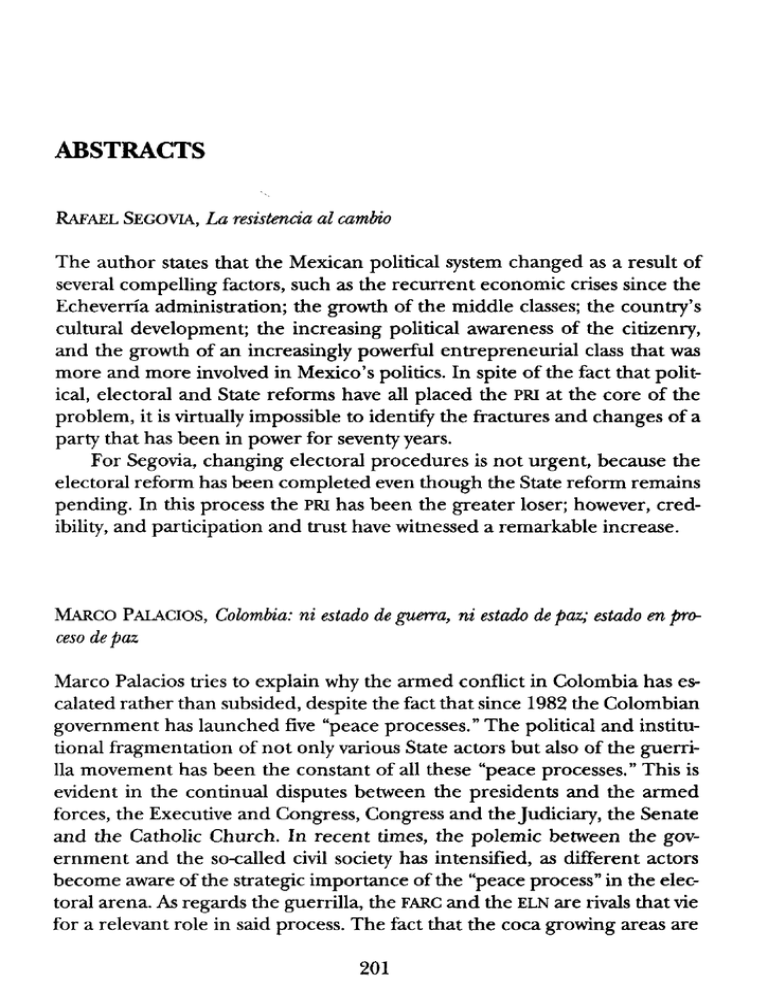
ABSTRACTS RAFAEL SEGOVIA, La resistencia al cambio The author states that the Mexican political system changed as a result o f several compelling factors, such as the recurrent e c o n o m i c crises since the Echeverría administration; the growth o f the middle classes; the country's cultural development; the increasing political awareness o f the citizenry, and the growth o f an increasingly powerful entrepreneurial class that was more and more involved in Mexico's politics. In spite o f the fact that polit­ ical, electoral and State reforms have all placed the PRI at the core o f the problem, it is virtually impossible to identify the fractures and changes o f a party that has been in power for seventy years. For Segovia, changing electoral procedures is not urgent, because the electoral reform has been completed even though the State reform remains pending. In this process the PRI has been the greater loser; however, cred­ ibility, and participation and trust have witnessed a remarkable increase. M A R C O PALACIOS, Colombia: ni estado de guerra, ni estado de paz; estado en pro- ceso de paz Marco Palacios tries to explain why the armed conflict in Colombia has es­ calated rather than subsided, despite the fact that since 1982 the Colombian government has launched five "peace processes." T h e political and institu­ tional fragmentation o f not only various State actors but also o f the guerri­ lla movement has been the constant o f all these "peace processes." This is evident in the continual disputes between the presidents and the armed forces, the Executive and Congress, Congress and the Judiciary, the Senate and the Catholic Church. In recent times, the polemic between the gov­ ernment and the so-called civil society has intensified, as different actors b e c o m e aware o f the strategic importance o f the "peace process" in the elec­ toral arena. As regards the guerrilla, the FARC and the ELN are rivals that vie for a relevant role in said process. The fact that the coca growing areas are 201 202 ABSTRACTS FIXL-l controlled by the FARC —which has a marked influence o n peasants—, s u p ports the U.S. government's claim that the conflict is the result o f "drugterrorism." O f late, the U.S. has b e c o m e the key mediator o f the conflict. In spite o f President Pastrana's reluctance to identify the guerrilla as drugdealers, Washington seems to insist o n doing so, and this only prolongs and makes an already complex situation even more so. A. C O R N E L I U S , Acogida ambivalente: economía, cultura y etnia en las polí­ ticas de inmigración de los Estados Unidos WAYNE This paper analyzes the sources o f public resistance to immigration in the United States in the late twentieth century. The complex interplay between e c o n o m i c and socio-cultural factors in determining general-public attitudes toward immigration policy is documented, using data from national-level public opinion surveys conducted from 1946 through 1998. It is c o n c l u d e d that the Mexican and other post-1970 immigrants to the United States are being fully incorporated into the U.S. economy, mosdy filling low-wage, lowskill j o b s that native-born Americans typically avoid. T o many native-born residents, however, the e c o n o m i c benefits o f a large and constantly expand­ ing supply o f immigrant labor are either unrecongnized or seen as being offset by non-economic costs, especially changes in the ethnic and linguis­ tic balance within the U.S. population. Thus, despite an increasingly tight domestic labor market in the United States, public concern about "exces­ sively" high levels o f immigration persists. M A N U E L GOLLÁS, El gobierno en el desarrollo económico de México This article discusses the role o f the government in the economy. Two prob­ lems are analyzed: how to define and measure the government's presence, and how to measure the impact o f its intervention in the economy. After re­ viewing the existing literature, Manuel Gollás makes estimates based o n Mex­ ican data. From his analysis o f quantitative data, the author concludes that: a) It is risky to establish criteria regarding the nature and impact, in the long run, o f the government size vis-a-vis economic development; b ) In the short term, the relationship between government size and e c o n o m i c growth is positive for almost all variables used as indica­ tors o f government size; ENE-MAR 2000 c) d) ABSTRACTS 203 As regards the question o f whether a private investment peso generates a greater net impact than a peso spent by the government, during a five-year period the net impact was greater when the peso was invested by private enterprise; W h e n comparing expenditures in human capital, the results were the opposite: each peso invested by the government in human capital had a greater positive impact o n growth than those achieved by private enterprise. P A B L O T H E L M A N S Á N C H E Z RAMÍREZ, El conflicto en Chechenia ¿ un nuevo Líbano ? In this paper Pablo Thelman discusses the historical background o f the conflict in Chechnya, its resurgence during Gorbachov's Perestroika, and its escalation in the 1990s. T h e author makes an historical and theoretical analysis o f the conflict's development and its implications for Russia's domestic and foreign policy. The Caucasus, and Chechnya in particular, is o f vital importance for Russia, for security, geopolitical, and e c o n o m i c reasons. La importancia del contexto socieconómico e institucional en el comportamiento de los empresarios durante la transición a la democracia: los casos de Chile y España A N S E L M O FLORES A N D R A D E , The author analyzes the relationship between the institutional and structural elements o f political change in Chile and Spain, as well as actors' characteristics, context, and peculiarities during the transition toward d e m o cracy, with a special emphasis o n entrepreneurs. While the authoritarian regimes in both countries enjoyed wide social support, the institutional framework o f Chile's political transition was strong and limiting, whereas in Spain Franco's death and Kingjuan Carlos' strong support facilitated a more flexible transformation. Entrepreneurs had spokespeople that were socially and politically accepted, and both in Chile and Spain they negotiated more stable political conditions. Unlike Chilean businessmen, their Spanish counterparts openly rejected labor laws and and fiscal reform. However, in both countries entrepeneurs succeeded in changing the public's negative opinion o f them.
